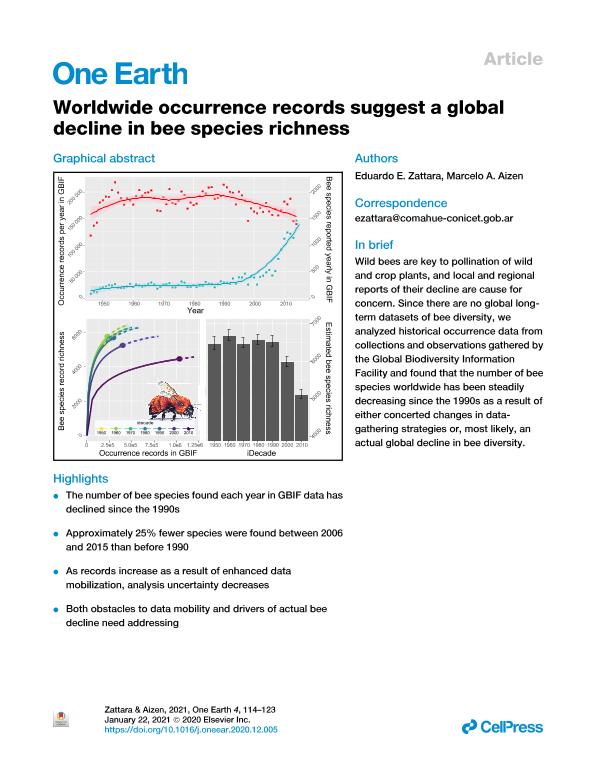Artículo
Worldwide occurrence records suggest a global decline in bee species richness
Fecha de publicación:
01/2021
Editorial:
Cell Press
Revista:
One Earth
ISSN:
2590-3322
Idioma:
Inglés
Tipo de recurso:
Artículo publicado
Clasificación temática:
Resumen
Wild and managed bees are key pollinators, ensuring or enhancing the reproduction of a large fraction of the world's wild flowering plants and the yield of ∼85% of all cultivated crops. Recent reports of wild bee decline and its potential consequences are thus worrisome. However, evidence is mostly based on local or regional studies; the global status of bee decline has not been assessed yet. To fill this gap, we analyzed publicly available worldwide occurrence records from the Global Biodiversity Information Facility spanning over a century. We found that after the 1990s, the number of collected bee species declines steeply such that approximately 25% fewer species were reported between 2006 and 2015 than before the 1990s. Although these trends must be interpreted cautiously given the heterogeneous nature of the dataset and potential biases in data collection and reporting, results suggest the need for swift actions to avoid further pollinator decline. Wild bee pollination is fundamental to the reproduction of hundreds of thousands of wild plant species and is key to securing adequate yields in about 85% of food crops. Declines in the abundance and diversity of bee species have been reported at local, regional, and country levels on different continents, but up to now there has not been a long-term assessment on global trends. We turned to publicly available data on specimen collections and observations gathered at the Global Biodiversity Information Facility, mostly coming from museum and academic collections and complemented by citizen-science efforts. We found that the number of bee species being collected or observed over time has been steadily declining since the 1990s. Although these results might in part reflect increased impediments to specimen collection and data mobilization, as well as reduced sampling coverage, they could also reflect a worldwide decline in bee diversity given that many species are becoming rarer and less likely to be found. Wild bees are key to pollination of wild and crop plants, and local and regional reports of their decline are cause for concern. Since there are no global long-term datasets of bee diversity, we analyzed historical occurrence data from collections and observations gathered by the Global Biodiversity Information Facility and found that the number of bee species worldwide has been steadily decreasing since the 1990s as a result of either concerted changes in data-gathering strategies or, most likely, an actual global decline in bee diversity.
Archivos asociados
Licencia
Identificadores
Colecciones
Articulos(INIBIOMA)
Articulos de INST. DE INVEST.EN BIODIVERSIDAD Y MEDIOAMBIENTE
Articulos de INST. DE INVEST.EN BIODIVERSIDAD Y MEDIOAMBIENTE
Citación
Zattara, Eduardo Enrique; Aizen, Marcelo Adrian; Worldwide occurrence records suggest a global decline in bee species richness; Cell Press; One Earth; 4; 1; 1-2021; 114-123
Compartir
Altmétricas




